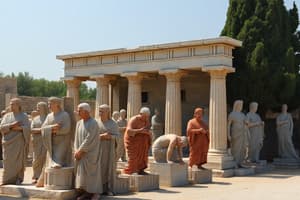Podcast
Questions and Answers
What was the role of the gods in Odysseus' journey home?
What was the role of the gods in Odysseus' journey home?
- They could only lengthen his journey and make it harder. (correct)
- They offered him favorable winds to speed his return.
- They were able to stop his journey altogether.
- They guided him directly to Ithaca.
Which realms are part of the Greek underworld?
Which realms are part of the Greek underworld?
- Olympus and Tartarus
- Hades and Elysium (correct)
- Tartarus and Olympus
- Elysium and Asphodel
Which hero is known for completing twelve labors?
Which hero is known for completing twelve labors?
- Theseus
- Heracles (correct)
- Odysseus
- Jason
What type of being is a centaur in Greek mythology?
What type of being is a centaur in Greek mythology?
Which gods supported the Trojan side in the Trojan War?
Which gods supported the Trojan side in the Trojan War?
What characterized the concept of religion in Ancient Greece?
What characterized the concept of religion in Ancient Greece?
Which of the following best describes the nature of Greek deities?
Which of the following best describes the nature of Greek deities?
Who is recognized as the king of the gods in Ancient Greek theology?
Who is recognized as the king of the gods in Ancient Greek theology?
What role did the Moirai play in Greek mythology?
What role did the Moirai play in Greek mythology?
In what regions were Greek religious practices prevalent?
In what regions were Greek religious practices prevalent?
How were changes in Greek religious practices typically managed?
How were changes in Greek religious practices typically managed?
Which of the following deities is associated with controlling the sun?
Which of the following deities is associated with controlling the sun?
What is a key characteristic of Ancient Greek religious mythology?
What is a key characteristic of Ancient Greek religious mythology?
Flashcards are hidden until you start studying
Study Notes
Religious Practices
- Ancient Greek religion consisted of beliefs, rituals, and mythology.
- There was no single word for "religion" in the modern sense.
- Greeks did not classify gods or practices into separate 'religions'.
- Religious practices extended beyond mainland Greece to islands, coasts, and colonies.
- Early Italian religions, such as Etruscan religion, were influenced by Greek religion.
- There was no centralized authority over religious practices and beliefs; change was regulated at the civic level.
- There was no organized "religion", but rather a group of closely related "religious dialects".
Beliefs
- Ancient Greek theology was polytheistic, with many gods and goddesses, and lesser supernatural beings.
- There was a hierarchy of deities with Zeus, the king of the gods, in control.
- Some deities had dominion over aspects of nature: Zeus (sky, thunder, lightning), Poseidon (sea, earthquakes), Hades (underworld), Helios (sun).
- Other deities ruled over abstract concepts: Aphrodite (love).
- Deities were visualized as "human" in form, but could transform into animals or natural phenomena.
- While immortal, the gods were not always good or powerful, and had to obey fate (Moirai).
- The gods acted like humans and interacted with them, sometimes having children - demigods.
- Gods sometimes opposed each other and tried to outdo each other: in the Iliad, Aphrodite, Ares and Apollo support the Trojans, while Hera, Athena and Poseidon support the Greeks.
Afterlife
- Greeks believed in an underworld inhabited by the spirits of the dead.
- Hades, a brother of Zeus, ruled over one of the most widespread areas of the underworld.
- Tartarus was a place of torment for the damned.
- Elysium was a place of pleasures for the virtuous.
Mythology
- Greek religion included extensive mythology, consisting of stories of gods interacting with humans.
- Myths often revolved around heroes and their actions: Heracles and his twelve labors, Odysseus' voyage home, Jason's quest for the Golden Fleece, Theseus and the Minotaur.
- Greek mythology included various species: gods, humans, Titans, centaurs, nymphs, satyrs, Cyclopes, Scylla, Charybdis, Gorgons, and the Minotaur.
Studying That Suits You
Use AI to generate personalized quizzes and flashcards to suit your learning preferences.



